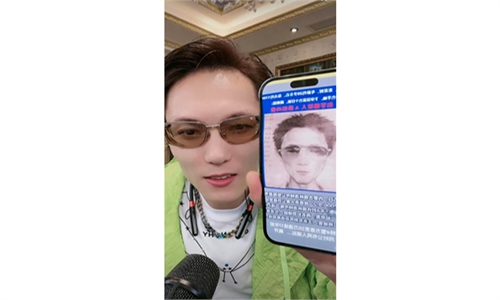ARTS / CULTURE & LEISURE
Outrage erupts over fake Stephen Hawking on Chinese live-stream, sparking call for stricter supervision

Photo: Screenshot from the website
The imitator, using the pseudonym "Huo Jin," is a homophone of the Chinese pronunciation of Hawking. He did not use any special makeup or prosthetics to impersonate Hawking; instead, he only wore a paper mask with Hawking's appearance on it.
During a live stream, he not only mimicked Hawking's appearance but has also engaged in degrading antics for profit. This includes performing dances and making crude jokes about ALS, in exchange for virtual gifts from viewers. When the audience gave him gifts, he even danced while holding the wheelchair.
"This behavior potentially infringes on Hawking's posthumous image rights and the dignity of disabled individuals," Lin An, a Beijing-based lawyer, told the Global Times on Sunday.
According to Lin, if these actions cause public outrage or psychological harm to Hawking's family, legal consequences could follow. Hawking's family would be within their rights to sue for defamation and emotional distress.
Douyin has responded to this case with a 15-day ban on "Huo Jin" for exploiting disabilities and bodily conditions for attention. However, this punishment seems insufficient as the impersonator continued his activities through alternate accounts.
This case is not isolated. There have been instances of impersonators mimicking other deceased celebrities like basketball legend Kobe Bryant. The impersonator held a basketball, wore Kobe's iconic number 24 jersey, and played the score See You Again as background music in the live stream.
Other users chose to imitate famous stars, such as US singer Adam Lambert and Chinese actor Zhang Songwen.
The lure of quick fame and fortune drives many to abandon ethical considerations, adopting the personas of famous figures to attract viewers and generate income through live-streaming and merchandise sales.
While impersonation in itself is not illegal, the context and manner in which it is done can lead to legal outcomes. Overstepping boundaries can infringe upon image rights and create unfair competition, particularly when audiences are misled into believing these impersonators have genuine connections to the celebrities they mimic.
The rise of these practices calls for stricter regulation and supervision. Social platforms must implement robust measures to prevent and penalize such behavior, experts said. This includes enhancing technical capabilities to detect and block unauthorized impersonations, developing comprehensive review systems, and establishing transparent rules and consequences for violations.
Moreover, viewers should be educated about the ethical implications of supporting such content, promoting a more respectful and conscientious online environment. Regulatory bodies should also step up to create and enforce laws that protect the dignity of individuals, both living and deceased, from exploitation in the digital space, experts said.


